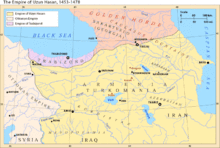Uzun Hasan
Uzun Hasan ( اوزون حسن 'Long Hasan' ; * 1423 in Diyarbakır ; † January 6, 1478 in Tabriz ) was a ruler of the Turkmen Aq Qoyunlu . He ruled over parts of western Iran , Iraq and Anatolia . His reign lasted from 1453 to 1478 .
His grandfather Qara Yoluq Osman Bey , a son of Princess Maria of Trebizond, was appointed administrator in Diyarbakır after successfully participating in the Battle of Ankara in 1402 against the Ottomans of Timur . From there he controlled the cities of Erzincan , Mardin , Urfa and Sivas . Qara Yoluq was able to assert his rule over these areas for a time against other rival tribes and principalities. In the fight against Iskandar of the Qara Qoyunlu, however, he was defeated and died of his wounds in 1435 at the age of 80 at Erzurum. With Qara Yoluq's death, a phase of inner turmoil occurred among the Aq Qoyunlu (who also shrank the territory), which only came to an end with Uzun Hasan's accession to the throne in 1453.
The eldest son of Uzun Hasan was called Oghurlu Mohammed and was the son of a slave ( umm walad ). Chalil Mirza, Yakub Bey, Yusuf Bey and possibly Masih Bey were sons of his Seljuk main wife ( mahd-i ʿulyā ) Shah-Begum. The mother of his son Zeynel, who is buried in Hasankeyf , is unknown.
In 1458 Hasan married again, this time Theodora Megale Komnena , the illegitimate daughter of the ruler of the Empire of Trebizond , John IV Komnenos . She was also known by the name Despina Chatun and lived far away in Harput . Despina remained a Christian and was buried in a church in Diyarbakır. With her, Uzun Hasan had three daughters and a son named Jacob, who was allegedly strangled by his brothers after Hasan's death. One of the daughters, Martha (also called Halime), married Sheikh Haidar von Ardabil and thus became the mother of Shah Ismail I. Another daughter named Alam-Shah-Begum was married to Sheikh Haidar's son Ali Mirza . Uzun Hasan's main wife, Shah-Begum, took an active role in government affairs.
In 1467 Hasan Dschahan Shah , the ruler of the Turkmen Qara Qoyunlu, defeated .
Uzun Hasan had good contacts with the Trapezunt Empire. When the Ottomans wanted to annex the empire, he sided with the emperor. This support did not help, however, so that the Ottomans took Trebizond on October 26, 1461. Uzun Hasan himself was defeated by the Ottomans in 1471 at Erzincan and on August 11, 1473 in the battle of Otlukbeli .
His eldest son, Oghurlu Mohammed Bey, rebelled against his father. He later fled to the Ottoman Sultan, but was then killed at the behest of Uzun Hasan.
The Venetian diplomat Ambrogio Contarini reported about Uzun Hasan after a trip he made to Persia in 1474. On behalf of Venice, he was supposed to bring about an alliance against the Ottomans with the Aq Qoyunlu. Uzun Hasan received him kindly in Isfahan in October 1474 , but there was no alliance between the two sides. Another Venetian diplomat who visited Uzun Hasan was Giosafat Barbaro .
After a train against Georgia, Uzun Hasan fell ill and died in the capital Tabriz in early 1478. Hasan's successor was his son Yaqub Bey. About 30 years after his death, his empire was eliminated by his grandson Isma'il, ruler of the Safavids .
Individual evidence
- ↑ Hans Robert Roemer: Persia on the way to the modern age. Iranian history from 1350-1750 . Ergon Verlag Würzburg, Beirut 2003, ISBN 3-89913-038-3 , p. 187 : "Then he [Qara Yoluq] took part in the Battle of Ankara in 804/1402 [...] Timur appointed the leader of the Aq Qoyunlu as a reward for his services as an emir and gave him the whole area of Diyarbakr as fief."
- ↑ Roemer: Persia on the way to the modern age . S. 188-189, 201-202 .
- ^ John Freely : The Grand Turk. Sultan Mehmet II - Conqueror of Constantinople, Master of an Empire and Lord of Two Seas . New York 2009, p. 124.
- ↑ Walther Hinz: Iran's rise to nation state in the fifteenth century . Walter de Gruyter & Co., Berlin 1936, p. 41, 96 : "She [Despina Hatun] had three daughters to her husband [Uzun Hasan], one of whom was to become the mother of Shah Isma'il, the founder of the empire [...]."
literature
- The Encyclopaedia of Islam. New Edition , article Uzun Hasan by VF Minorsky
- Peter B. Golden : An Introduction to the History of the Turkic Peoples, Otto Harrassowitz-Verlag, Wiesbaden 1992, pp. 366-372.
- Walter Hinz: Iran's Rise to a Nation-State in the Fifteenth Century, Walter De Gruyter & Co., Berlin 1936. Uzun Hasan's Rise, pp. 34-71; on the nature of the Aq Qoyunlu state pp. 101-122.
- Hans Robert Roemer : Persia on the way to modern times. Iranian history from 1350-1750, Ergon Verlag Würzburg. For the life and work of Uzun Hasan v. a. Pp. 202-214.
- John E. Woods: The Aqquyunlu. Clan, Confederation, Empire. Revised and Expanded Edition, University of Utah Press, Salt Lake City 1999.
| personal data | |
|---|---|
| SURNAME | Hasan, Uzun |
| ALTERNATIVE NAMES | Langer Hasan (German) |
| BRIEF DESCRIPTION | Turkmen rulers |
| DATE OF BIRTH | 1423 |
| PLACE OF BIRTH | Diyarbakır |
| DATE OF DEATH | January 6, 1478 |
| Place of death | Tabriz |
